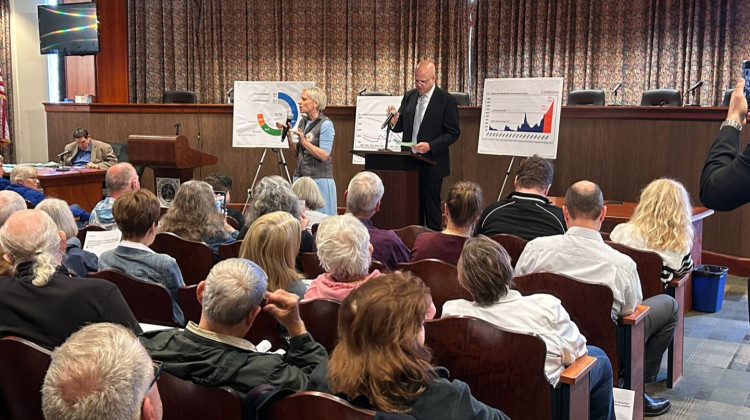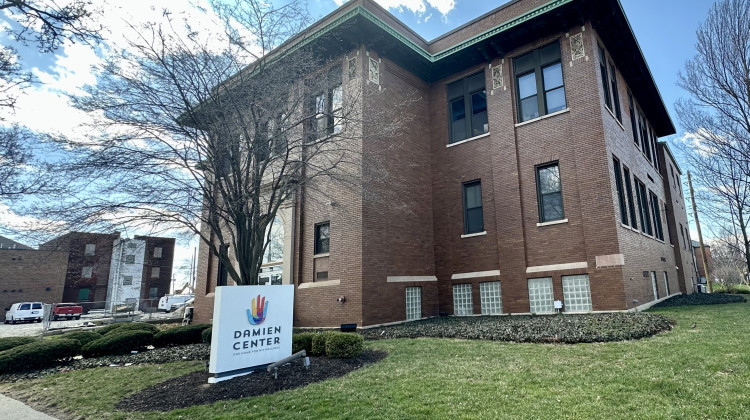
Industry and transportation leaders discuss infrastructure solutions at a forum in Indianapolis Thursday.
Annie Ropeik/IPBA who’s-who of Midwest business leaders met in Indianapolis Thursday to talk about their stake in updating the nation’s aging transportation system.
Many say Indiana’s plans for road repairs should stand as a national, multi-modal example.
Ports of Indiana CEO Rich Cooper, who helped host the roundtable discussion, says the state and national economies rely on more than ships and barges. Changes at one part of the system, he says, have huge ripple effects on the rest.
“Ports are nothing more than transportation exchange points. We’re handing off from the rail to water, from the highway to truck, from the truck back onto the water,” Cooper says. “And I think speaking as one voice collectively with all these modes can help give it some balance.”
Cooper and his counterparts in other industries and transportation sectors say Indiana’s new road funding package is a model solution, with its earmarked tax hikes and local input.
Indiana Chamber of Commerce President Kevin Brinegar says that model’s value includes the public outreach it involved.
Upgrading the nation’s infrastructure, he says, “is going to require investments at significant levels higher than are occurring today, and just like we did in Indiana, we need to make the case to the public why this was needed.”
The American Society of Civil Engineers, which in March gave the U.S.’s infrastructure a D+ grade, estimates the system needs $4.5 trillion in improvements by 2025.
Indiana Transportation Commissioner Joe McGuinness says tackling that will require, “at minimum,” a unified, regional approach.
“When it comes to economic development, it’s no longer a competition between Indianapolis and Columbus, Ohio. It’s Indianapolis and China, Indianapolis and Germany,” he says. “The only way we’re gonna win … is if we all come together.”
The group agreed that some central “convener,” maybe modeled on the logistics council Conexus Indiana, should lead the charge to coordinate and communicate those collective goals on the federal level.
Robyn Boerstling, vice president of infrastructure for the National Association of Manufacturers, calls the current administration a “generational opportunity” to make headway on infrastructure – despite what she described as a bleak mood and many distractions in Washington.
“It’s incumbent upon us to de-escalate that hyper-partisanship when we talk about transportation, because it is so bipartisan,” Boerstling says. “We just have to keep on it and keep reminding our members of Congress and our Senators that this has to get done, and it cannot be postponed.”
Though the group acknowledged this planning and execution will take years, factory executives say these updates are critical.
Even tiny delays on the roads or in rail yards can cost businesses millions of dollars, according to business leaders at the roundtable – and a bridge collapse or the closure of an important waterway would be catastrophic.
ArcelorMittal Burns Harbor operations manager Dale Heinz cites the Poe Lock, between Michigan and Ontario, as a piece of ailing infrastructure that’s crucial to his business. It’s long overdue for upgrades, and it moves all of the iron ore Heinz’s huge steel mill receives via Lake Michigan.
“If that lock were to fail catastrophically … I’d be less than two weeks from [being] out of materials, factory shut down,” he says. “Four thousand employees out of work … at just one factory.”
But the stakeholders say infrastructure plan has to think big – accounting for workforce issues such as trucker shortages, changing technologies and long-term maintenance.
McGuinness says short-term investment won’t go far without a sense of the system’s future.
“We need to have a better understanding of what our auto manufacturers, our Tier 1 and Tier 2 suppliers are building and when,” he says, citing self-driving cars and autonomous barges as budding technologies that could change the needs of the transportation system. “We need to know what we need to be building.”
The roundtable was organized by the American Association of Port Authorities as part of Infrastructure Week.
 DONATE
DONATE





 View More Articles
View More Articles


 Support WFYI. We can't do it without you.
Support WFYI. We can't do it without you.